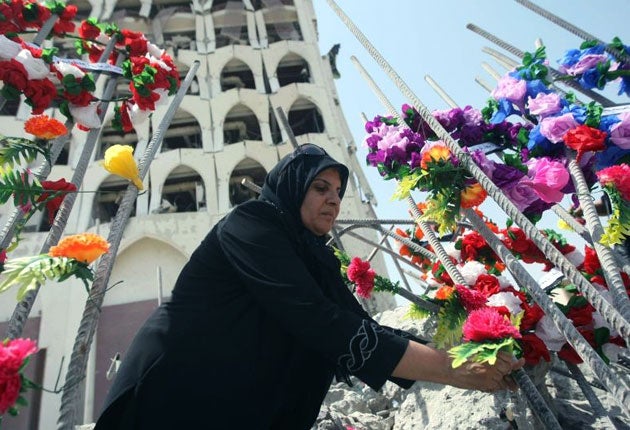Robert Fisk: Saddam revisited as Iraq accuses Syria of sheltering Baathist bombers
World Focus: In the Saddam-Hafez era, they hanged each other's bombers

Your support helps us to tell the story
From reproductive rights to climate change to Big Tech, The Independent is on the ground when the story is developing. Whether it's investigating the financials of Elon Musk's pro-Trump PAC or producing our latest documentary, 'The A Word', which shines a light on the American women fighting for reproductive rights, we know how important it is to parse out the facts from the messaging.
At such a critical moment in US history, we need reporters on the ground. Your donation allows us to keep sending journalists to speak to both sides of the story.
The Independent is trusted by Americans across the entire political spectrum. And unlike many other quality news outlets, we choose not to lock Americans out of our reporting and analysis with paywalls. We believe quality journalism should be available to everyone, paid for by those who can afford it.
Your support makes all the difference.In Damascus and Baghdad, it almost feels like the old days. Mutual abuse and recriminations, the recalling of ambassadors – and only a matter of time, perhaps, before Syria and Iraq break diplomatic relations.
Iraq's Prime Minister, Nouri al-Maliki, demands an international tribunal because Syria won't hand over a couple of Iraqi Baathists whom he blames for the suicide bombing deaths of at least 100 civilians in Baghdad. Syria snaps back that it's always been a refuge for those facing "injustice".
Twenty years ago, Saddam Hussein and Hafez el-Assad sent bombers to Damascus and Baghdad to blow up each other's cities. Now Maliki and Hafez's son, Bashar, are attacking each other. For all the tribal connections, historical relations, the "fraternal" love of Arab unity – Syria likes to call itself the "beating heart of Arabism" – it seems the two neighbours will go on roaring at each other in time-honoured fashion.
In the Saddam-Hafez era, they hanged each other's bombers in public, Syria's agents swinging slowly in the breeze in Baghdad's public squares while Saddam's killers performed the same act in Damascus. These days, things are a little more civilised. The Iraqis don't actually capture any bombers – they have already vaporised themselves – but they call upon international law while the Syrians pose as the refugee safe haven of the Middle East.
Yet Syria clearly has the better memory, Maliki the shorter. Back in the bad old days of mutually hostile Syrian-Iraqi Baathism, Maliki and Jalal Talabani – now the President of Iraq – sought refuge in Damascus from the fury of Saddam's regime. Both were grateful – or at least they were then – that Hafez had taken mercy on their souls and welcomed them to the "mother of the Arab nation" (another Syrian sobriquet). Today, the Syrians have been quick to remind the pair of this act of generosity – and to point out their hypocrisy.
"Syria never handed over people who took shelter from the threat of injustice, arbitrary acts and death," the official Al-Thawra newspaper announced. "... they [Maliki and Talabani] all know what their fate would have been if Syria had such political morals." The Syrians have not denied that Mohamed al-Younis and Satam Farhan are in Damascus – al-Younis was a senior member of Saddam's Baath party – but have demanded proof of their involvement in the Baghdad bombings, something which Damascus believes (correctly) that the Iraqis will find it hard to provide.
But the hypocrisy that Syria condemns can be discovered on both sides of the border. I met the Syrian general in charge of building barriers and watchtowers along the Syrian-Iraqi frontier in what he clearly believed was a genuine effort to prevent the transit of insurgents into Iraq. But the last time I met the family of a suicide bomber in Lebanon – he assaulted an American convoy in western Iraq, very close to the Syrian border – I was told by his uncle that the man had "gone to Iraq because it was easier to cross the Syrian border to attack American soldiers than it was to cross the Lebanese border and attack the Israeli enemy".
In truth, there was always a gritty, no-nonsense but sometimes understanding relationship between Baathists in Iraq and Syria, even when Saddam was ruling. The founder of the party, Michel Aflaq, was a Syrian Christian who ended his days in Iraq. According to his family, his tomb was badly damaged after the 2003 American invasion – it lies in what is now the American-controlled Green Zone. As Baathists themselves, therefore, al-Younis and Farhan are merely "brothers" – brothers, indeed, who can no doubt add to Syria's formidable intelligence about American military strategy and Maliki's forces inside Iraq.
But Al-Thawra's praise of Syria's political integrity needs to be read with an eye on history. Syria never handed over people threatened with death, it tells us. But wasn't there a Kurdish guerrilla leader – a man called Abdullah Ocalan – who was nurtured by the Syrians, supported by the Syrians, threatened with death by the Turks, and then summarily told to leave Damascus when the Turks threatened military action against the Assad regime? And after various peregrinations in Africa, did he not end up in the hands of the Turkish secret service? He languishes to this day in a Turkish jail.
Join our commenting forum
Join thought-provoking conversations, follow other Independent readers and see their replies
Comments